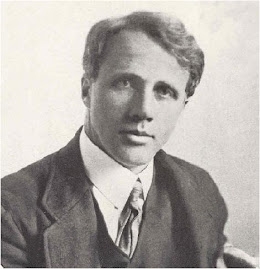
"My November Guest"
My Sorrow, when she's here with me,
Thinks these dark days of autumn rain
Are beautiful as days can be;
She loves the bare, the withered tree;
She walks the sodden pasture lane.
Her pleasure will not let me stay.
She talks and I am fain to list:
She's glad the birds are gone away,
She's glad her simple worsted gray
Is silver now with clinging mist.
The desolate, deserted trees,
The faded earth, the heavy sky,
The beauties she so ryly sees,
She thinks I have no eye for these,
And vexes me for reason why.
Not yesterday I learned to know
The love of bare November days
Before the coming of the snow,
But it were vain to tell he so,
And they are better for her praise.
In this poem, Frost wants to show that November is the transitional time of the year that people usually don’t enjoy. This is because it is not summer anymore, and its sunny days and warm weather are gone, and it is not winter yet, with its snow-filled trees and cold, cozy nights that have yet to arrive. Frost explains to the reader that usually during this time, most people have an uninvited guest called Sorrow, which is, in fact, the feeling that usually accompanies this kind of atmosphere. Throughout the whole poem, Sorrow is being personified, acting like an uninvited guest for the speaker, for example in line 1 where he states, “My Sorrow, when she’s here with me”, and trying to tell him the awful things November days bring. An example of a metaphor is present in line 12, “The faded earth, the heavy sky”. The earth cannot fade, and the sky cannot possibly be heavy. During the first three stanzas, you believe that the speaker is indeed being dragged into this gloomy state. What can be beautiful for Sorrow, is actually not enjoyable to the regular human, because Sorrow is not a feeling connected to the beautiful. In the last stanza though, you see that the speaker enjoys all the characteristics of November days. He states, “Not yesterday I learned to know/The love of bare November days” (Lines 17 & 18). He does not even bother telling Sorrow that he likes what she likes, by saying “But it were vain to tell her so/And they are better for her praise” (Lines 19 & 20) because Sorrow is a better narrator for these kinds of feelings.
For more information, please visit the following links:
http://www.eliteskills.com/analysis_poetry/My_November_Guest_by_Robert_Frost_analysis.php
http://www.americanpoems.com/poets/robertfrost/12033/comments
http://classicalpoetryforums.com/showthread.php?t=75
http://22poetry.com/showthread.php?t=75
